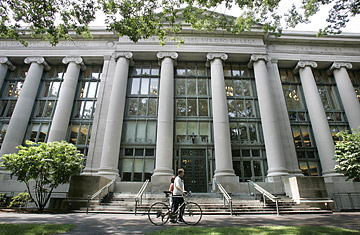
Harvard Law Library
After serving as a 2008 summer associate at Philadelphia law firm Morgan, Lewis & Bockius, Harvard Law School student Juan Valdivieso was offered a position as a full-time associate and was anxiously looking forward to joining the firm later this year.
Then, in an instant, everything changed. On March 12, Valdivieso received a memo explaining that the sagging national economy had forced the firm to defer his position for a year. Suddenly, with two months remaining in his law-school education, the 28-year-old found himself tantalizingly close to a degree and no place to apply it.
"The first thing that went through my head was, 'What do I do now?' " he said earlier this week from Boston. "It was disappointing to learn that I had to change plans and disappointing that I will have to postpone some of the things I was looking forward to." (See 25 people to blame for the financial crisis.)
Valdivieso certainly is not the only casualty of creative downsizing in the legal industry these days. As the nation's economic climate flounders and legal work dries up, a growing number of large and midsize law firms are eschewing layoffs by redistributing or deferring young associates instead.
Some firms, such as Los Angeles–based Latham & Watkins and San Francisco–based Orrick, Herrington & Sutcliffe, have offered $75,000 annual compensation packages to incoming associates who defer employment until October 2010 and find alternate work in public-interest law. Other firms, like Morgan Lewis, have told deferred associates they can earn up to $60,000 per year if they work in public service, plus an additional $10,000 if they continue to study for the bar. Overall, firms estimate that these deferral arrangements could save them $25,000 to $85,000 per employee. (Read "Job Forecast for College Seniors: Grimmer Than Ever.")
"There's no question that all of these firms are trying to make the best of a bad situation," says James Leipold, executive director of the National Association for Law Placement, located in Washington.
For many associates, some work is better than no work at all. The legal industry has seen its share of layoffs in recent months — according to industry website Lawshucks.com, at least 2,100 attorneys have been laid off in 2009, bringing the total to more than 3,000 since January 2008.
Ward Bower, principal at Altman Weil, a legal management consulting firm in Newtown Square, Pa., predicts many U.S.-based law firms will earn nearly 10% less in 2009 than they did in 2008 — performance that threatens to cause upheaval.
Among those who are still employed, reaction to deferments and fellowship options largely has been harsh. Many associates privately complain about how law firms have betrayed trust by promising jobs they may not be in a position to deliver. On public (but anonymous) websites like Abovethelaw.com, most critics have expressed outrage at what they perceive to be a breach of contract. Still, Sandra Sperino, an assistant professor of law for the Beasley School of Law at Temple University in Philadelphia, notes that because most states provide at-will employment, firms can change the terms of a job offer at any time.
Other criticisms of the current climate have focused on debt, bemoaning that gargantuan loans for law school aren't exactly easy to defray. According to the American Bar Association, the average law-school student who graduates this year will do so with a little more than $73,000 in debt. Larry Kramer, dean of Stanford Law School in Palo Alto, Calif., acknowledges there's a problem. "Something about the way the system works has to give," he says. "If you're going to defer someone for a year, there really needs to be a certain degree of loan forgiveness to ease the burden [on associates]." (See pictures of the evolution of the college dorm.)
One undisputed upside to the current trend is that public-interest and legal-aid firms will finally receive some much needed help. Bob Glaves, executive director of the Chicago Bar Foundation, says these organizations are experiencing a "perfect storm" of dramatic cutbacks and an expanding need for services. "These groups desperately need assistance with a crisis of their own," says Glaves, whose organization is the charitable arm of the Chicago Bar Association. "Programs that help them and provide associates with real-world experience benefit everyone involved."
Ramon Arias, executive director of Bay Area Legal Aid in Oakland, Calif., agrees, noting that he would "emphatically" welcome new associates with open arms. Still, Arias adds that his organization is so understaffed that an influx of young and eager associates could present an already overworked infrastructure with a host of logistical challenges. "A lot depends on our capacity to incorporate these lawyers in an effective way," he explains. "Who oversees employee benefits? What about health insurance? Bar dues? Nonpersonnel costs?"
Many law firms say they are still working out specifics of their public-interest programs, though it appears some firms may cover benefits such as health and life insurance as part of a public-service deal.
Back in Boston, Valdivieso, the deferred Morgan Lewis associate, isn't waiting for anyone. The fledgling attorney said he has started looking into opportunities working for a public-interest group that specializes in civil rights. "It's not what I expected, but I'm excited at the chance to do meaningful legal work," he said. "In this economy, things could be a lot worse."
Read "Spring Break, Recession Style: Staying Close to Home."
